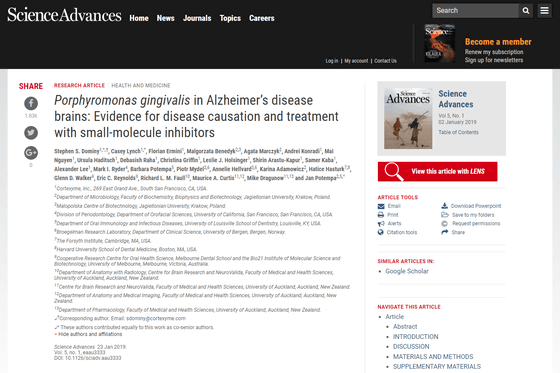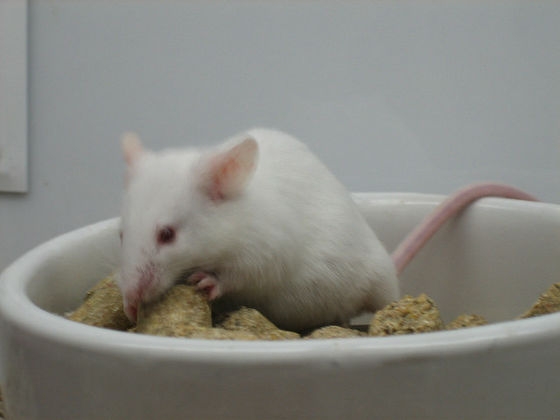'Periodontal disease bacteria' may emerge as a cause candidate for Alzheimer's disease, toothpaste may be useful for prevention of Alzheimer's disease

by Håkan Dahlström
More than 30 million people are suffering from Alzheimer's disease affecting behavior, thought, and memory worldwide. Herpesvirus is suspected to be involved in its onset, but apart from this, a paper claiming the involvement of "periodontitis bacteria" has been published in the journal Science Advances.
Porphyromonas gingivalis in Alzheimer's disease brains: Evidence for disease causation and treatment with small-molecule inhibitors | Science Advances
http://advances.sciencemag.org/content/5/1/eaau3333

Gum disease-able bacteria could spur Alzheimer's | Science | AAAS
https://www.sciencemag.org/news/2019/01/gum-disease-causing-bacteria-could-spur-alzheimer-s
We may finally know what causes Alzheimer's - and how to stop it | New Scientist
https://www.newscientist.com/article/2191814-we-may-finally-know-what-causes-alzheimers-and-how-to-stop-it/
This paper was published by a cofounder of a pharmaceutical company · Cortexyme (Cortexim), a psychiatrist Stephan Dominie and Casey Lynch who was studying Alzheimer's disease as a graduate student.
Cortexim's research team collaborated with research institutes in Europe, America, New Zealand and Australia to report the previous report that periodontal disease bacteria Porphyromonas gingivalis (P. gingivalis) can be found from the brain of a deceased Alzheimer's disease patient After confirming, I found DNA of P, gingivalis from the spinal cord secretion solution of the life-sustaining Alzheimer's disease patient. Furthermore, a toxic enzyme "gingipain" produced by P. gingivalis was found in 96% of the brains of 54 patients with Alzheimer's disease.
In the brain where more gingipain was found, a large amount of the proteins " tau " and " ubiquitin " which are strongly related to Alzheimer's disease are present, and even in the elderly brain with no dementia tendency, gingipain · tau · ubiquitin I found a small amount. Based on this, Mr. Lynch says that the onset of Alzheimer's disease can be anticipated by grasping the increasing trend earlier.
In order to investigate whether gingipain actually relates to the onset of Alzheimer's disease, the research team applied P. gingivalis to healthy mouse teeth every other day for a period of 6 weeks. Then, from the brain, higher levels of amyloid β protein and P. gingivalis were found. The research team believes that gingival pine produced by P. gingivalis may damage Tau and its damage promotes the formation of " tangles " found in Alzheimer's disease patients.

by Rene Schwietzke
On the other hand, it was also confirmed that administration of antibiotics targeting gingipain inhibits the production of amyloid β protein and consequently decreases nerve degeneration. According to Cortexim, there were signs of improvement in nine cognitive abilities among Alzheimer's disease patients.
James Noble, a neurologist at the Columbia University, who is investigating the relationship between periodontal disease and Alzheimer's disease, said that the number of P. gingivalis shown by the study by Cortexim is "the greatest so far" It is a comprehensive approach. "
Meanwhile, Robert Moier of Harvard University attached Massachusetts General Hospital admitted that P. gingivalis is highly likely to be involved in amyloid β protein accumulation and neurodegeneration, but P. gingivalis and gingipain have Alzheimer's disease Skeptical about the view that it is the direct cause of the cause. In fact, in other studies investigating the relationship between periodontal disease and Alzheimer's disease, P. gingivalis and gingipain were not necessarily found from patients with Alzheimer's disease.
Mr. Moire questioned the "amyloid β hypothesis" that the amyloid β protein accumulated in the brain kills brain cells, and rather a person who launched a novel that amyloid β is protecting the brain from herpes virus.
Wound struggle up to research announcement by researchers who reversed the theory and approached the mechanism of Alzheimer's disease - GIGAZINE

Whether it is caused by herpesvirus, P. gingivalis or even other factors is not clear yet, Mr. Noble said "If you want to reduce the risk of Alzheimer's disease, it's time to brush your teeth "I commented.
Related Posts:
in Science, Posted by logc_nt






